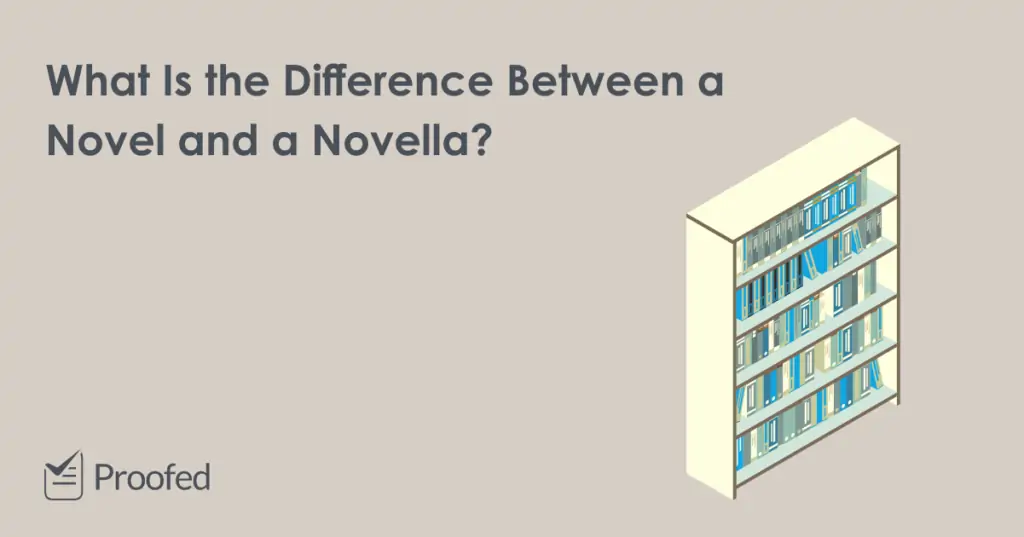If you’re an aspiring author, you may be planning to write a novel or short story. But have you considered a novella or novelette instead? These literary forms allow writers to tell stories of different lengths. Check out our overview of what novellas and novelettes involve to find out more.
Novels, Novellas and Novelettes: A Comparison
The key identifying feature of novellas and novelettes is the length:
- Typically, a full-length novel is at least 40,000 words long.
- Also known as a “short novel” or a “long short story,” novellas range from 17,500 to 40,000 words in length.
- The novelette usually falls between 7,500 and 17,500 words.
Historically, novellas were often satirical. George Orwell’s Animal Farm (1945) is one example of this. However, the only defining feature of a novella is length, so you can tell a variety of stories across genres with this form.
The novelette, meanwhile, was often associated with whimsical or sentimental stories, particularly romances. There are plenty of famous examples, including Edgar Allan Poe’s comedic story, The Spectacles (1844). As with the novella, though, the only defining feature of a novelette is its length, so you can use it for any type of story.
One difference between the novel and these shorter forms, though, is that the novella and novelette are much rarer nowadays. And many publishers do not consider novellas or novelettes commercially viable. Nevertheless, we think there are good reasons to write a novella or novelette.
Why Write a Novella or Novelette?
Reasons writers should consider writing a novella or novelette include:
- Developing as a Writer – Novellas and novelettes can work as stepping stones between short stories and a full-length novel. So if you’ve been writing short stories but you’re not ready to take on a 40,000 word novel yet, a novella or novelette can help you develop your storytelling skills.
- World Building – These forms can be great for world building. For instance, if you are writing a series of sci-fi or fantasy novels, shorter stories can let you explore other aspects of the fictional world.
- Spin-Offs – Similarly, if you’ve written a longer story and want to build upon this, you can user a shorter literary form for a spin-off. You could use a novella to explore a side character from your existing stories, for example.
- Ebooks – While print publishers may be reluctant to publish novellas or novelettes, there are fewer limits on ebooks (especially if you self publish). These shorter formats are highly readable, too, so you may be able to find readers seeking a middle-ground between short stories and a novel.
5 Tips for Writing Novellas and Novelettes
Now that we have established a case for these two formats, how should you go about writing them? Here are a few quick tips:
1. Place Limits on the Story
To keep your story concise, work with self-imposed limits. Try not to include too many characters, for instance. You could also limit the time over which the story takes place. For example, if you write a story about a single week in a single character’s life, you have a defined limit from the start.
Find this useful?
Subscribe to our newsletter and get writing tips from our editors straight to your inbox.
2. Write Character Sketches
Since you have limited space to flesh out characters, you’ll want to begin writing the story with a clear idea of who they are. Even as a general writing tip, maintaining notes on character traits and arcs, especially for your protagonist(s), is a great way to ensure consistency.
3. Craft a Powerful Opening Paragraph
In any story, your opening paragraph should set the tone of what follows. But this is even more important when you have fewer words to work with, such as in a novella, so focus on making the opening as gripping as possible.
4. Focus the Plot
A novel might include several, intertwining storylines or a main plot and several sub plots. And while there is more room for this in a novella or novelette than in a short story, it is usually a good idea to focus on one main plot line, as otherwise you may struggle to tie everything up. You may also need a tighter pace in a shorter story than a novel.
5. Don’t Worry About the Length
Ultimately, constraints on length are arbitrary. The story police are not going to arrest you if you start out writing a novelette and it accidentally turns into a novella or novel somewhere down the line.
And if you do need to stay under a certain length (e.g., if you are submitting something to a competition with a word limit), you can usually reduce the word count while redrafting. All you need to do is edit ruthlessly.
Speaking of which, if you have a story you want to share but you need a little help polishing it, make sure to try our editing and proofreading services!



